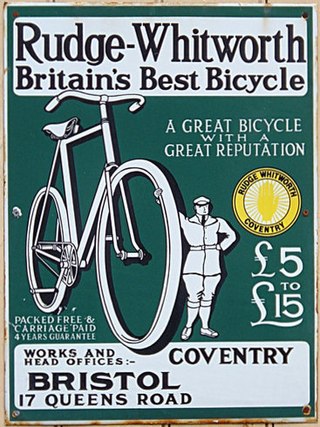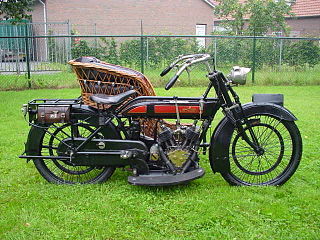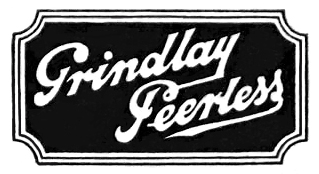
The Birmingham Small Arms Company Limited (BSA) was a major British industrial combine, a group of businesses manufacturing military and sporting firearms; bicycles; motorcycles; cars; buses and bodies; steel; iron castings; hand, power, and machine tools; coal cleaning and handling plants; sintered metals; and hard chrome process.
Falcon Cycles is a British bicycle manufacturer which was based in Brigg, North Lincolnshire, owned by Tandem Group.
Triumph Engineering Co Ltd was a British motorcycle manufacturing company, based originally in Coventry and then in Meriden. A new company, Triumph Motorcycles Ltd, based in Hinckley, gained the name rights after the end of the company in the 1980s and is now one of the world's major motorcycle manufacturers.
Coventry Victor was a British motorcycle and car manufacturer. Originally Morton & Weaver, a proprietary engine manufacturer in Hillfields, Coventry, founded in 1904, the company changed its name to Coventry Victor Motors in 1911. The company closed in 1971.

Excelsior, based in Coventry, was a British bicycle, motorcycle and car maker. They were Britain’s first motorcycle manufacturer, starting production of their own ‘motor-bicycle’ in 1896. Initially they had premises at Lower Ford Street, Coventry, and 287-295 Stoney Stanton Road, Hillfields, Coventry, Warwickshire before moving to Kings Road, Tyseley, Birmingham in 1921.

J. A. Prestwich Industries, was a British engineering equipment manufacturing company named after founder John Alfred Prestwich, which was formed in 1951 by the amalgamation of J. A. Prestwich and Company Limited and Pencils Ltd.

Villiers Engineering was a manufacturer of motorcycles and cycle parts, and an engineering company based in Villiers Street, Wolverhampton, England.

The Cotton Motor Company, was a British motorcycle manufacturer of 11a Bristol Road, Gloucester, and was founded by Frank Willoughby Cotton in 1918. F.W. presided over the company until his retirement in 1953. The company was reconstituted as E. Cotton (Motorcycles) Ltd, and traded until 1980. The marque was later resurrected in the late 1990s by a business which manufactured replicas of earlier machines.

Rudge Whitworth Cycles was a British bicycle, bicycle saddle, motorcycle and sports car wheel manufacturer that resulted from the merger of two bicycle manufacturers in 1894, Whitworth Cycle Co. of Birmingham, founded by Charles Henry Pugh and his two sons Charles Vernon and John, and Rudge Cycle Co. of Coventry.

New Imperial was a British motorcycle manufacturer founded by Norman Downes in Birmingham, between 1887 and 1901, and became New Imperial Motors Ltd in 1912, when serious production commenced. New Imperial made innovative motorcycles that employed unit construction and sprung heel frames long before they became commonplace, and were moderately successful in competition. The 1920s were a financially successful decade, enabling the innovations of the 1930s that fought decline.
Rex, Rex Motorcycles, Rex-Acme, was a car and motorcycle company which began in Birmingham, England in 1900. Rex soon merged with a Coventry maker of bicycles and cars named Allard and then later in 1922 the company merged with Coventry's 'Acme' motorcycle company forming 'Rex Acme'. The company existed until 1933, and, in its heyday, was considered one of the greatest names in the British motorcycle industry.

Francis & Barnett Limited was an English motorcycle manufacturer founded in 1919 by Gordon Inglesby Francis and Arthur Barnett and based in Lower Ford Street, Coventry, England. Early motor cycles were affectionately known as ' Franny B'. Motorcycles were produced for enthusiasts and were reasonably affordable for citizens for use as general transport. The majority of the lighter motorcycles used Villiers and later Two-stroke engine and later Associated Motor Cycles AMC engines. During the 1930s the 250cc Cruiser model 250 cc (15 cu in) was developed with a faired engine that protected those riding from any oil or dirt – one of the first of its kind to do so. AMC took over Francis & Barnett Limited in 1947 combining this with the James motorcycle models in 1957. The combined company remained in business until 1966.
Ambassador Motorcycles is a British motorcycle manufacturer. Founded by racer Kaye Don after the World War II, the company produced lightweight motorcycles with Villiers and JAP engines and imported Zundapps from Germany. Production started in 1947 with a 197 cc Villiers-engined bikes. In 1953 a model was produced with electric starters and the first Ambassador twin appeared in 1957. The company was taken over by DMW in 1963 who continued production until they closed the company in 1965. Ambassador Motorcycles was reformed in late 2016.
DMW Motorcycles was a British motorcycle manufacturer. Based in Wolverhampton, DMW was founded in 1940. The company took over Ambassador Motorcycles in 1963 and continued production until they closed the company in 1965. Although DMW ceased motorcycle production in 1971, it was noted for trials and racing machines and many DMWs can still be seen at UK sporting events. DMW produced about 15,000 motorcycles and several other manufacturers used DMW forks and engines.
The Rover Company was a British bicycle and motorcycle manufacturer before it began the manufacture of motor cars. Rover was established in 1878 by John Kemp Starley in Coventry to produce bicycles. The company developed and produced the Rover Imperial motorcycle in November 1902. Between 1903 and 1924, Rover produced more than 10,000 motorcycles.

The Ruby Cycle Co Ltd. was a British motorcycle manufacturer based in Ancoats Manchester. Founded in 1909 the factory produced a range of motorcycles under the Royal Ruby brand until 1932.

Hazlewoods Limited of Coventry were manufacturers of bicycles from 1895, and motorcycles from 1911 until closure c. 1923. They were typical many British companies who proceeded from bicycle manufacture to motorised bicycles, a change made possible by engine and geared hub suppliers.

The Bown Manufacturing Company was established in 1862 in Birmingham by local machinist, William Bown, making a variety of patented mechanical parts. The name Aeolus had been used as a trademark since 1877 and especially for cycle parts. A second-cousin took over the company when the founder died in 1900 and began making powered-cycles also under the Aeolus brand. Production was interrupted by the First World War, after which motorcycles were marketed under the Bown brand until 1924. The company was subsequently acquired by the Aberdale Cycle Company in the 1930s.

Grindlay Peerless is a historic motorcycle manufacturer that operated out of Coventry, England, throughout the early 20th-century, specialising in racing machines including the record breaking 498cc Grindlay Peerless.

The Acme Motor Co is a defunct manufacturer of motorcycles that operated from premises in Earlsdon, Coventry. The company started manufacturing in 1902. It was taken over by Rex motorcycles sometime before 1920. In 1922 the name of the company was changed to Coventry Acme Motor Co, later that year the company was merged with Rex motorcycles to form Rex-Acme.















